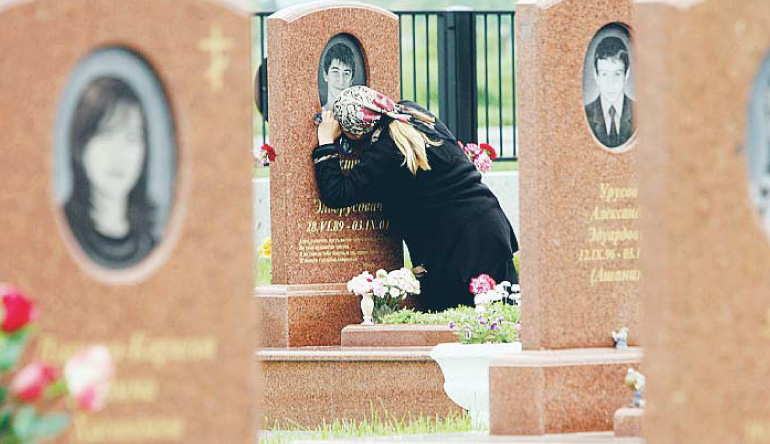IT IS perfectly normal to grieve – not just the loss of a loved one, but also the loss of a relationship, object of value or health.
“Grief is a normal response and it’s a process, not an event you get over,” Calvary Life Ministries (CLM) director Pam Guneratnam said.
CLM is a community-based counselling centre consisting trained counsellors. It started a grief support group for grieving persons to work through their grief with the support and companionship of others who are also on the same journey.
“Bereavement doesn’t necessarily start at the time of death because some patients and family members know the patient will die. This is anticipatory grief and they need support through that,” said Hospis Malaysia deputy medical director Dr Sylvia McCarthy.
Hospis Malaysia gives palliative care services to improve the quality of life of patients when curative treatment is not an option. Among others, they help patients and their families to cope through various ways such as day care services (a two-prong effort to allow the patients time to socialise and give the family a break), loan of equipment for patients and bereavement services.
Anticipating a break-up in a relationship may also stir up different emotions: Sad yet relieved that it’s over.
Grieving process
The classic process of grieving involves five stages: Denial, anger, bargaining, depression and acceptance (see above).
“Allow yourself to grieve. There’s no right and wrong way of expressing your feelings. According to research, some people take almost three years to fully recover,’’ said Pam.
The grieving process is not a linear one and the person may remain at one stage for a long time or go back to earlier stages, but will naturally move on. When the person gets stuck, counsellors may help by asking the person to bring an object to talk about the deceased, hence jumpstarting the process again.
Letter writing is a useful way to express regrets, pain, loss and sadness during this period.

Grieving is necessary
Even people, young ones included, who do not face death of a loved one grieve. The loss of a girlfriend, for example, is not just one loss but it’s a loss of a companion, best friend, Friday night dates and more, according to Pam.
“Young people may act out rather than talk it out,” said Pam, adding that it does not mean they should throw tantrums or lash out.
Research has shown that young people or children who grieve come out better, matured and handle life better.
“If a person does not grieve, they may function well until some point of time, they will break out. You can’t force someone to come out with the emotions but talk to them about the usefulness of sharing what they feel,” Dr Sylvia advised.
Losing a person is not something you get over easily. Rather, you need to find an emotional space for the person by accepting the loss, going through the pain and adjusting to life without that person.
“Not that you try to forget the person but keep memories with you; they are with you in some ways but not dominating your life,” said Dr Sylvia.
She gave as an example the case of a 19-year-old girl who left her studies to care for her father until his death. Her friends in school kept in touch with her constantly since she could not leave the house. Their strong friendship was essential to her. She is now concentrating on her studies as part of fulfilling her late father’s wish.
“Moving on is not being disloyal to the deceased,” said Dr Sylvia.
Choosing a few mementoes to keep and celebrating anniversaries are helpful and finding strengths in other relationships is paramount.
Mourn along
PEOPLE often ask, “What should I say to my grieving friend?” Well, it’s not what you say but how you listen to them, according to Dr Sylvia McCarthy of Hospis Malaysia. Young people go through the same, real and gripping emotions when they mourn a loss. More so, it happens at a time when they are facing a lot of changes becoming an adult, shouldering family responsibilities and trying to be strong for others while dealing with a whole range of emotions.
“The things to look out for in a grieving youth would be changes in academic performances; behavioural changes such as missing school and acting out in violence, substance abuse, and becoming very withdrawn or the other extreme,” Dr Sylvia explained.
She added that parents should talk openly with their children about their feelings and what is going on as well, rather than be strong and hide the emotions. When they are able to participate in the grieving, it makes the loss real and they are able to get over it faster.
“Don’t tell them how they should feel or what they should do,” said Pam Guneratnam of Calvary Life Ministries.
Be a listener and empathise with the person. You could also do practical things for them.
“They are emotionally tied up so you could get food for them, drive them to places, take notes for them and keep them updated what happened in college.”
At this point of time, sometimes even making basic decisions such as where and what to eat would be helpful.
DON’T SAY
- I understand how you feel (because you really can’t).
- Don’t worry, it’s okay.
- You’re better off without him.
- You should be happy, at least it’s over now.
DO SAY
- If you would like to share, I’m here to listen.
- I hope you know I’m there for you.
- I can’t imagine how you are feeling now.

